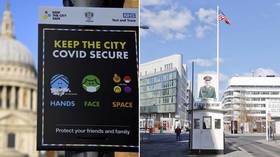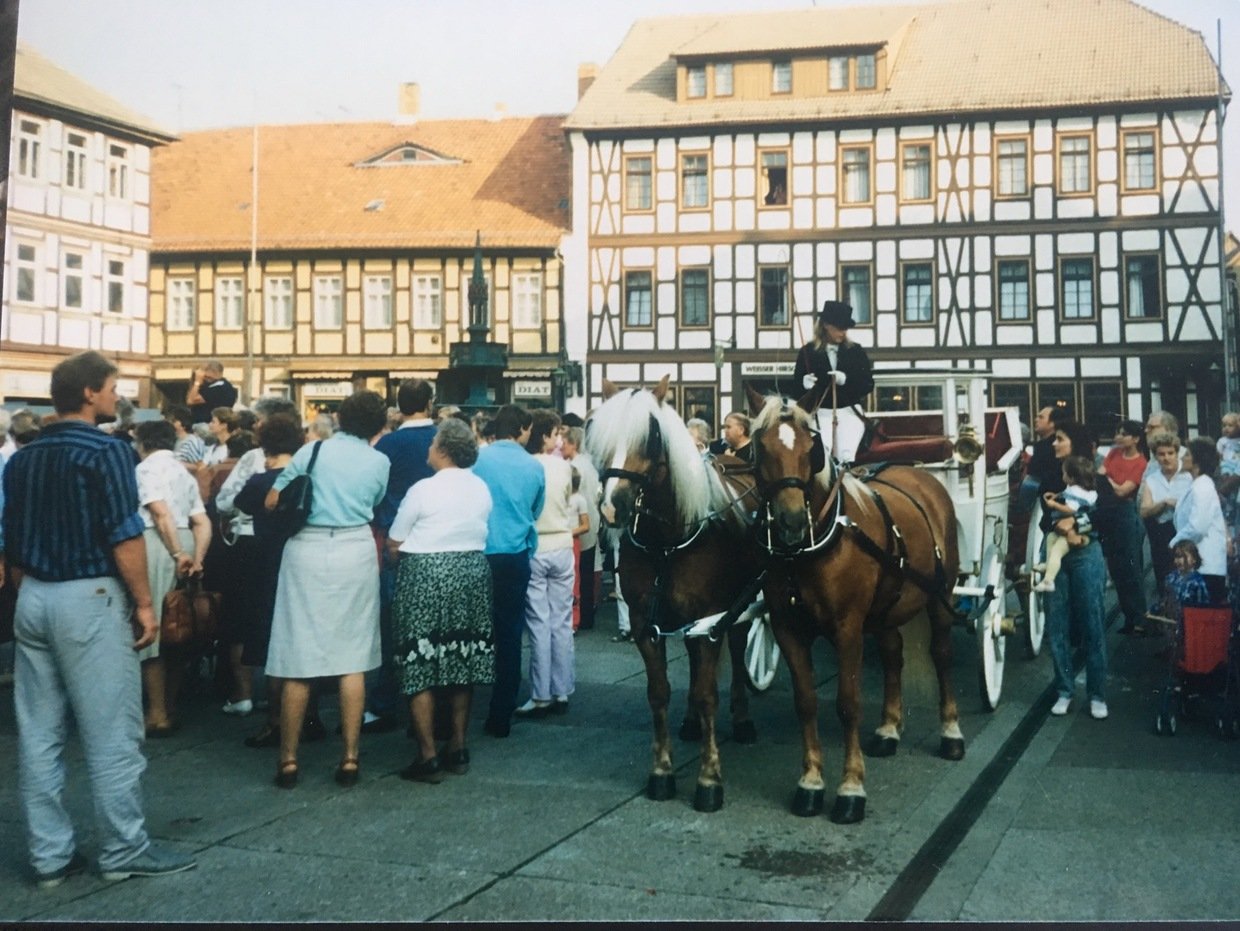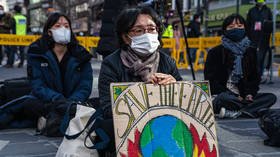Lockdown Britain turning into East Germany? No, in many ways it's worse than the old DDR. Believe me… I was there

“I don’t want to live in East Germany,” says Nigel Farage in a new video in which he expresses concern at where Britain is heading. He has a point; I was in the DDR in 1989 and found it to be less oppressive than Britain today.
It started with stamps. My interest in the ‘German Democratic Republic’ began when a very nice lady called Frieda, who lived on our road when I was a child, started to give me her old East German stamps for my collection. She was from the DDR, and went every year to visit her elderly mother there. She told my mother she was followed by the secret police when she went back. My apolitical fascination with this rather mysterious ‘Behind the Iron Curtain’ country grew. I had a pen friend who lived in Karl-Marx-Stadt (Chemnitz), and we exchanged football pennants and stickers. In September 1989, I was finally able to visit. It was some experience.
Without wishing to brush over or downplay in any way the negatives, which I will go into, I found the country was a lot less grim than popularly portrayed. Perhaps that was partly due to the gloriously sunny weather. But it soon became clear to me that, despite living in a ‘dictatorship’, people could still enjoy happy, meaningful lives. I remember packed bars and restaurants (including one self-service cafeteria that was open all night at Erfurt station, where my friend and I spent our first night on wooden benches).
We also witnessed a very joyous old-style wedding – with horse and carriage – in the centre of beautiful Wernigerode, the quaint little town in the Harz Mountains where we stayed. I travelled around on trains (including a wonderful old steam locomotive), buses, and trams. In Magdeburg, I went to a football match. I chatted with people wherever I went. I found everyone friendly and eager to enter into conversations. I was also struck by the very high general level of education. People loved talking about books.

It’s a sobering thought that things I could do in East Germany in 1989 I cannot do in the locked-down Britain of today. Pubs, restaurants, and nightclubs are shut, by Order of the State. Ditto theatres and other places of public entertainment. Football matches are played ‘behind closed doors’. Earlier this week, Vaccines Minister Nadhim Zahawi appealed for people not to stop and chat to friends they bump into outside, and also told people not to sit on park benches! “Don’t go out and sit or have that opportunity of social interaction,” he said. Again, this is worse than East Germany. You could always meet your friends there, and make new ones too.
In less than 12 months, Britain has been transformed from a relatively free country into an authoritarian police state where physical social interaction is strongly discouraged, if not illegal. Last week, we saw a shocking video of police breaking into a home in Scotland after a ‘tip-off’ that there were ‘too many people’ there.
In Wales, a couple were given a fixed penalty notice for travelling seven miles to see the wife’s 94-year-old mother in a care home, a journey the police deemed ‘unnecessary’. “I feel like I'm living in some sort of dystopian novel after what happened,” a ‘mortified’ Mrs Carol Richards said afterwards (After much publicity, the fine was subsequently rescinded, but that still doesn't excuse the police action).
Under the ‘rules’, people have even been prevented from visiting seriously ill loved ones in hospital. Just how inhuman is that?
The biggest bugbear people I spoke to had with life in the old DDR was the restrictions on foreign travel. But although we have no Berlin Wall, we have restrictions on travel in Britain today (at least for the plebs). When Home Secretary Priti Patel boasted about ending free movement, the left presumed she was talking about immigration. It transpired it was the British people’s free movement that was ending, under the guise of fighting a virus.
And with the World Economic Forum-sponsored roll-out of health passports – which the power behind the throne, Tony Blair, assures us “will” happen – will those who refuse to get vaccinated ever be able to leave the country again? It’s certainly a major concern.
Also on rt.com Meet ‘Dr’ Tony Blair, warmonger turned vaccination guru and health passport promoterEast Germany had its Stasi, which we all know about; in ‘free democratic’ Britain, people are encouraged to call ‘hotlines’ and use ‘online portals’ to snitch on their neighbours if they believe they are breaching Covid regulations. My friend, the Oxford academic Mark Almond, tweeted that he has a friend who is a chairman of a gardening association here, but who was in East Berlin in 1983. Mark’s friend told him she had received anonymous denunciations of breaches of lockdown in the allotment! “Makes one nostalgic for the Stasi,” she remarked.
A friend who is chairman of a gardening assoc. here but who was in East Berlin in 1983 as I was, told me she received anonymous denunciations of breaches of lockdown in the allotment! "Makes one nostalgic for the Stasi" she remarked. https://t.co/qxXboDadOr
— Mark Almond (@mpalmond) January 13, 2021
“Ah,” I hear some of you say… “But East Germany was a de facto one-party system, whereas Britain is a multi-party democracy. There’s really no comparison.” But what use is having opposition parties if they all toe the ‘official’ line and agree with the government on the biggest issues of the day? All of the parliamentary parties are pro-lockdown. The only opposition to the Conservatives from Labour has been on the lines of “You’re not locking down hard enough!” When Parliament debated the latest lockdown measures last week, just 16 MPs – out of a House of 650 – voted against. Not one Labour MP opposed.
It was the very wise French writer Antoine de Saint-Exupery who noted in ‘The Little Prince’, “what is essential is invisible to the eye.” So it is with societies. We can cite GDP figures until we’re blue in the face, but the important thing about a country is how things feel. Are people happy? Is there joy to be had in everyday life?
The mood in East Germany in September 1989 was optimistic. Perhaps people thought positive change was on its way. Perhaps others were genuinely enthused by the 40 Jahre DDR celebrations. I don’t feel the same atmosphere in Britain today. People seem demoralised and depressed. That’s borne out by the news that antidepressant use soared in 2020, with six million people in England receiving anti-depressants in the three months to September – the highest figure on record.
The downbeat national mood is not at all surprising when you consider that people have been physically isolated from one another and we have been fed a 24/7 diet of fear-porn from the government and most of the media for the past nine months. Relentless psychological warfare has been waged on us. It has certainly taken its toll. Who wouldn’t be depressed if they watched Piers Morgan and ‘Good Morning Britain’ every day?
East Germany was an attempt to build a ‘workers’ state’ out of the ruins of the Third Reich. But although economically it represented a big change to what had gone on before, with a largely collectivised planned economy, the important point is that everyday life wasn’t that much different to how it had been for centuries. The basics remained the same.
People could still go out, socialise, have a laugh and a joke, a pint and a smoke, spend time with their families, and find love and romance and happiness in chance encounters. In other words, do all the things that make life worth living. But such simple pleasures – which we took for granted before March 2020 – are deprived to us in Britain today, where under the imposition of the ‘Great Reset’ we are being conditioned to accept as a ‘new normal’ an entirely abnormal way of living that goes against every human instinct.
Also on rt.com As Boris Johnson announces Britain’s ‘great reset’, were the Covid ‘conspiracy theorists’ right all along?As bad as things are in early 2021, even worse will follow, unless there is a massive pushback against the globalists’ dystopian agenda. An agenda which, as my fellow RT.com columnist Tomasz Pierscionek pointed out last week, is about constructing a “living hell that combines the worst of Communist totalitarianism with the worst of capitalism’s detached callousness towards those deemed expendable, perhaps topped off with liberal and woke militants cancelling those committing thought crimes.”
In a TV interview on Wednesday, Health Secretary Matt Hancock admitted he had no timetable for a lifting of lockdown even after vaccinations. Priti Patel has already told us“social distancing is here to stay.” Chief Medical Officer Chris Whitty has said that lockdown (if it is ever eased) could be re-imposed next winter.
Is this really our future? Rolling lockdowns, bans on seeing our families and friends, and threats of even tougher restrictions hanging permanently over us? And all this while being told to ‘mask up’ and keep two or even three metres away from our fellow human beings – and of course not to chat to them. The utterly hellish and soul-destroying ‘New Normal’ designed for us by the Davos elites makes late 1980s East Germany – for all its well-documented faults – look like paradise on Earth. Just think about that for a moment.
Think your friends would be interested? Share this story!
The statements, views and opinions expressed in this column are solely those of the author and do not necessarily represent those of RT.















